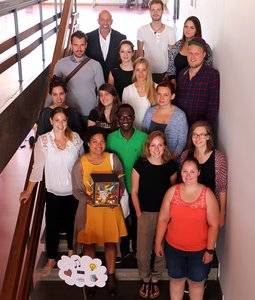How our brain works – meaning of neuroscientific discoveries
Blue colored slices of apple, strongly salted chocolate – most people have to think at least twice, if experimental foods like these are to their liking. It is our brain’s fault, contingent upon evolution it sends out warning signals to indicate danger and shows us we are leaving safe territory. A seminar with Prof. James Giordano in the project „Der Coburger Weg“ at the Coburg University of Applied Sciences and Art intensively deals with how the brain works und demonstrates the meaning of neuroscientific discoveries for the fields of art, design and social work.
„How far can we go?“ students asked in one of altogether four final presentations in the seminar of Prof. Dr. James Giordano. He is Chief of the Neuroethics Studies Program in the Pellegrino Center for Clinical Bioethics, and Professor in the Departments of Neurology and Biochemistry at Georgetown University Medical Center, Washington, DC, USA, and Visiting Professor of Brain Science, Technology, and Ethics at the Coburg University of Applied Sciences. The students of social work, health promotions, health management and interior design taught their classmates about the Comfort-Stretch-Panic-Model and prepared a slightly different kind of picnic: discolored foods like eggs and fruits and cola smelling of vinegar. Just a few of their fellow students dared trying. If we see or taste groceries like these, changed in taste and appearance, complex processes are taking place in our brain, characterized by our various experiences and always following one rule that is essential of our survival: safety first. But for us to learn and expanding our knowledge, it is important to get out of our comfort zone from time to time, according to the students. They explained impressively, how artists, architects and designers are using these findings for their work.
During the semester, Prof. Giordano took his students on a journey: brain mechanisms, the role of colors, shapes and smells, brand new insights to current developments in brain science and related ethical aspects. The student’s final presentations now topped off the seminar. Professor Giordano gave his students a free hand in both choice of topic, type of presentation and literature as long as the presentation dealt with the brain somehow or other and was held in English, as was the whole seminar.
The partly highly creative presentations truly enthralled Giordano: „Three different disciplines, that work together internationally und interdisciplinary, with every one taking up their own perspective and sharing it with the others – that is what „Der Coburger Weg“ is all about and all students did a very good job in meeting the project’s aims.” But that is not the end of it. Prof. Giordano encourages all students to keep in contact with him after the seminar ended. “Who once was my student, remains a colleague forever”, the neuroscientist says. In Summer 2017, the students from Coburg have occasion to stay with him at Georgetown University for up to three month to develop a research project on their own und submit the results to a paper. The first students have already indicated interest.

